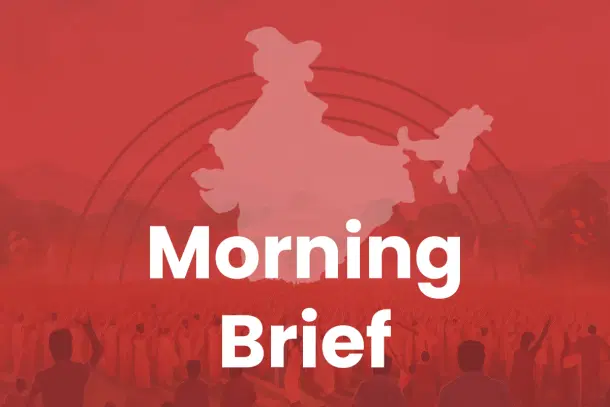News Brief
Morning Brief: India Readies Plan To Cut Dependence On China For Rare Earth Magnets; Army To Get Rs 30,000 Crore Air Defence Boost; Pakistan Desperate For Indus Water Talks
Swarajya Staff
Jun 10, 2025, 08:03 AM | Updated 08:03 AM IST
Save & read from anywhere!
Bookmark stories for easy access on any device or the Swarajya app.


Kick-start your morning with Swarajya’s Morning Brief – your news fix, curated for clarity and insight.
India Plans PLI Scheme To Cut Rare Earth Magnet Dependence On China
India is finalising an incentive-based manufacturing scheme with a Rs 3,000 crore outlay to build domestic capacity for rare earth magnets, aiming to produce up to 4,000 tonnes over the next 7–10 years. The plan, similar in design to a PLI scheme, will involve a 2–5 year gestation period followed by phased disbursal of incentives based on sales value.
This move follows China’s tightening of rare earth exports, including new end-use restrictions on buyers like Indian automotive component makers. Over 30 Indian companies, including Bosch, Continental, and Sona Comstar, are currently navigating a complex export certification process involving EUCs and Chinese embassy vetting. India currently imports around 3,600 tonnes annually.
Army To Get Rs 30,000 Crore Air Defence Boost
India’s Ministry of Defence is poised to approve a Rs 30,000 crore proposal to procure three regiments of indigenous Quick Reaction Surface-to-Air Missile (QR-SAM) systems for the Army. The mobile systems—developed by DRDO—can track and destroy aircraft, helicopters, drones, and other aerial threats up to 30 km away.
This move comes in the wake of Operation Sindoor (May 7–10), where Indian air defences reportedly neutralised Turkish drones and Chinese missiles launched by Pakistan. The QR-SAMs are designed to move with armoured units and fire from short halts, offering tactical battlefield coverage. Bharat Electronics and Bharat Dynamics will co-produce the systems.
The Army eventually requires 11 QR-SAM regiments. These will complement existing air defences including the S-400 Triumf (380 km), Barak-8 (70 km), Akash (25 km), and VSHORADS (6 km), while Project Kusha aims to deploy a 350 km-range indigenous system by 2029.
Pakistan Makes Desperate Appeals For Indus Water Talks
Amid a deepening water crisis, Pakistan is making increasingly desperate appeals to resume talks on the Indus Waters Treaty, with Water Resources Secretary Syed Ali Murtaza writing multiple times to India—without a single response. New Delhi has firmly refused to engage, insisting that no discussions will be held until Pakistan addresses cross-border terrorism and agrees to overhaul the outdated treaty.
Pakistan's urgency stems from critically low water levels in key reservoirs like Tarbela and Mangla, which are nearing their “dead levels,” threatening irrigation for the ongoing Kharif crop season. The Indus River System Authority (IRSA) has reported a 21 per cent nationwide water shortage, with live storage in major dams slashed by nearly 50 per cent. Flows from Punjab’s dams have also declined by 15 per cent year-on-year, and India’s recent regulation of Chenab River flows following the Pahalgam terror attack has further strained the crisis—leaving Pakistan desperate and isolated.
Other Developments
Pakistan Eyes Defence Spending Hike Despite Soaring Debt
Despite facing a ballooning external debt of $87.4 billion and paying $7.8 billion in debt servicing last year, Pakistan is expected to significantly hike its defence budget in the upcoming financial year. The move follows a 16.4 per cent increase in military spending last year, even as Islamabad sought an IMF bailout to avert economic collapse. With the bailout now secured and recent damage to Pakistani military infrastructure from Indian strikes under Operation Sindoor, defence allocations are likely to rise further.
China remains Pakistan’s largest lender with $15 billion in outstanding loans, though it received only $602 million in debt repayments last year. It also continues to be Pakistan’s top arms supplier, accounting for nearly 80 per cent of its arsenal.
Bad Weather Delays Indian Astronaut’s Launch to Space Station
The launch of the Axiom-4 mission, which includes Indian Air Force Group Captain Shubhanshu Shukla, has been delayed to 11 June due to unfavorable weather, SpaceX confirmed on Monday. The mission will lift off aboard a Falcon 9 rocket from NASA’s Kennedy Space Center, with a backup window on 12 June
This will be the first flight of SpaceX’s Dragon spacecraft for an Axiom mission and the second use of the first-stage booster. The crew, which includes astronauts from India, Poland, and Hungary, will spend up to 14 days aboard the International Space Station conducting over 60 experiments. Veteran US astronaut Peggy Whitson will command the mission.
Another Chinese Scientist Held In US For Smuggling Bio-Material
A Chinese scientist pursuing an advanced degree at Huazhong University in Wuhan has been arrested at Detroit airport for allegedly smuggling biological material into the U.S. without a permit. According to the FBI, the material—related to certain worms—was sent months ago to a University of Michigan lab, including a package hidden inside a book. The scientist, who planned to spend a year at the university, remains in custody ahead of a bond hearing on Wednesday.
This is the second such arrest in recent days. Just last week, U.S. authorities charged two other Chinese scientists for attempting to smuggle a toxic fungus. Officials say these incidents violate strict import rules and could threaten national security, though experts say the material involved doesn’t appear to be dangerous.
Trump Deploys Marines To LA As Immigration Protests Surge
Tensions between President Donald Trump and California intensified as 700 Marines were deployed to Los Angeles to support National Guard forces amid escalating immigration protests. The deployment comes in response to massive protests following the mass arrests of over 40 individuals by immigration agents last week. California Governor Gavin Newsom condemned the move as an overreach and announced that the state would sue the federal government over the deployment.
The Marines and National Guard troops in California are not expected to carry out law enforcement duties, as the Posse Comitatus Act prohibits such actions. While the Insurrection Act would allow military involvement in policing, President Trump has not invoked it, and it's still unclear if he intends to.
From The States
Bengal Voter Under Lens For Role In Bangladesh Protests
The Chief Electoral Officer of West Bengal has asked officials in South 24 Parganas to investigate Niutan Das, a registered voter in Kakdwip, who allegedly participated in Bangladesh’s 2024 student protests that led to the fall of the Hasina government. Photographs of Das at the protests have surfaced online, prompting concerns over voter list integrity and cross-border infiltration.
Das claims Indian citizenship and says he got caught in the Bangladesh unrest during a visit for ancestral property matters. However, his cousin has contradicted his account, stating Niutan holds dual voting rights in both countries. Political heat escalated after a photo emerged of Das celebrating a birthday with a Trinamool student leader. The controversy comes amid Mamata Banerjee’s charges of widespread voter list irregularities in the state.
Himachal Opens Shipki La Pass Near China Border To Tourists
Himachal Pradesh is set to open the strategically located Shipki La Pass near the India-China border to Indian tourists for the first time. Located in the Kinnaur district at 4,000 metres altitude, Shipki La has so far been accessible only to locals and for limited trade. The state government, in coordination with the Army and Indo-Tibetan Border Police (ITBP), will allow up to 210 Indian visitors per day with Aadhaar-based entry.
Chief Minister Sukhvinder Singh Sukhu said the initiative follows 18 months of consultation with defence authorities and will boost local tourism in the remote border region. Tourists will be allowed to travel up to the Indian border checkpoint, from where Chinese infrastructure is visible.
You’re all caught up—until next time.





